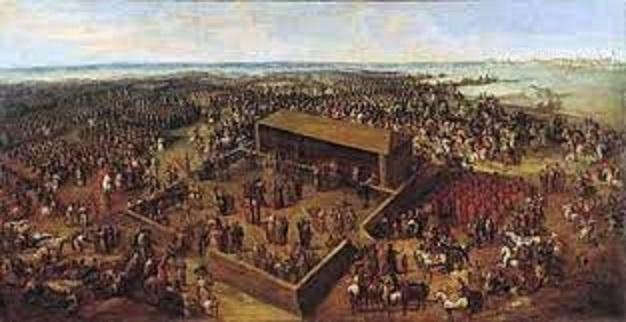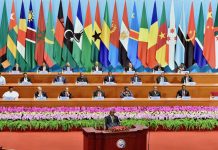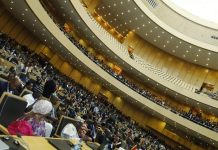Africa-Press – Lesotho. What makes a country a wealthy, successful democracy? Is it policy, or ideas or the quality of people, and its leadership? Or is income per capita the most important factor? Recent research seems to draw a direct correlation between income and democracy – but there are twists and contradictions.
Are you allowed to vote for whoever runs your country? If you are allowed to vote, is the election free with anyone allowed to run as a candidate, irrespective of political party or government connections? Can you express your views without being clapped in prison or sacked from your job? Whatever the answers, you might well assume that it is the state of politics and government in Africa that will determine the result. But there is another view that says politics is irrelevant. What counts is per capita income.
The argument is simple. The clash of ideas, of religions and of politics has nothing to do with whether a country is a democracy or a dictatorship. If you look at historical trends in the levels of income and in the evolution of political systems in countries anywhere in the world, there emerges a very clear link between certain levels of wealth and the emergence of democracy.
That at least is the conclusion of many political economists. If you live in a country with a per capita income over $10,000 – like Botswana – you are almost certainly to be living in a strong democracy. If you live in a state where the per capita income is less than $1,000 (and unfortunately there are plenty of African examples) you are almost certain to be living in a strong autocracy.
The political character of everywhere in between those two extremes is likely to be determined by just how much income there is to go around. With every dollar more of income, the chance of turning democratic increases, and that chance can be calculated to an exact percentage. If true, it turns out that business is what determines freedom.
Take Egypt, for example, a country that straddles Africa and the Middle East, and which is currently experiencing a raging conflict between the army, Islamists, and reformist pro-democrat liberals. The debate over the state of democracy in the country is intense: many believe democracy cannot survive.
But according to the ‘money equals democracy’ theory, what happens in the public squares and the mosques of Cairo is completely irrelevant to the political outcome. The only thing that is relevant is that some time next year, Egypt will pass the $6,000 annual per capita income mark (because surprisingly enough, Egypt’s economy is still growing at around 5% a year). And if a country passes that critical point with a working democracy in place, then there is only a 1% chance in any year that democracy will fail.
The theory
This is not a new theory. Most recently some work has been done by Charles Robertson and Renda Rundle at Renaissance Capital or ‘Rencap’, an investment bank that concentrates on emerging markets, that supports the idea that Africa’s political future is shaped by its income levels. They say that the moment that any one country will move from autocracy to democracy can be mapped on to a future calendar with a precise degree of likelihood. They also claim that once a country gets above a certain level of per capita income and turns democratic, there is almost zero chance of slipping back.
But this work only builds on earlier research. Two political scientists called Adam Przeworski and Fenando Limongi published similar research in 1997, tracking 80 countries over 50 years to determine whether there was a correlation between GDP and the likelihood of democracy taking hold.
That in turn built on work published in 1959 by the sociologist Seymour Lipset and much more recently, the idea that as countries get richer they tend to get more like Western democracies was popularised by Francis Fukuyama in his 1992 book The End Of History And The Last Man. All of these research projects share one conclusion: that democratic systems are the logical end-point of development, and once a country’s economy is generating enough income, the democratic transition is next to inevitable.
The big question is: are they right?
Unfortunately, in the case of Africa, the answer is not simple. One reason for that is that is the shortage of countries in sub-Saharan Africa with sufficiently high incomes to test the theory fully. The Rencap research concluded that the critical per capita income level for democracy to be fully established – what they rather optimistically call the ‘immortal’ democracy – is $10,000 a year. Reaching that level does not guarantee that democracy will suddenly flourish, they say, but it does mean that it is very unlikely that once institutionalised it will be reversed.
Rencap built on the earlier research by Przeworski and Limongi by expanding the time period covered to 1950–2009, and looking at the experience of nearly 150 states, with per capita figures based on constant 2005 purchasing power parity US dollars.
On that basis, in sub-Saharan Africa, only four countries qualify for the chance to experience ‘immortal’ democracy: Botswana, Gabon, Mauritius and the Seychelles all have a per capita income of $10,000 a year, although it is likely that South Africa will join Botswana in that rich country bracket this year.
All those four $10,000-plus countries are classified as democracies by the Polity IV data project, a widely used research measure of how democratic or authoritarian states are. Botswana and Mauritius are characterised as ‘strong’ democracies, and Gabon and Seychelles as ‘weak’ – but democracies all the same. According to Rencap, because they have per capita incomes above $10,000 a year, they are extremely unlikely to revert to autocracy. So far, there has been no case of a state with incomes above $10,000 a year ever having lost democracy, once it is established.
But – and it is a big but – there are plenty of cases of states with incomes well above that critical $10,000 level that have never achieved democracy in the first place. Tellingly, they are all resource-based economies, and usually oil-producing states. And in resource-rich
Africa that is a very important proviso: it seems there is something about reliance on wealth dug from the earth that does not encourage democracy.
A predictive guide?
Nevertheless, the data amassed by Rencap and the earlier researchers provides a remarkable predictive guide to the fate of political systems in transition. If a country does have a democratic system for selecting and replacing governments, then the per capita GDP data combined with the history of political change tell us exactly how robust the system is: the data show what the chances of democracy’s survival are. The one variable that appears to make a huge difference is whether people are getting richer or getting poorer. When incomes are growing, the chance of democracy surviving is greater. When incomes are shrinking the system is more likely to return to autocracy.
If per capita income is below $800 then there is an 8% chance every year that a democratic system will collapse, and that is when incomes are growing. If they are falling then that rises to 11% each year. In other words, no democratic system is likely to last very long in such poor countries.
Broadly speaking, as per capita GDP income levels rise, the chance of democracy collapsing falls. By the time an economy is delivering over $6,000 per capita to the population, there is only a 1% chance of democracy collapsing in any one given year. By the time a country achieves an income level of $10,000 or more, as long as there is a democratic system in place, then statistically there is zero chance of it collapsing – which simply means that no democratic country of that income level ever returned to autocracy during the 69 years covered by the data.
For sub-Saharan Africa, which is a continent in transition and where very few countries have incomes above $6,000, this data combined with long-term GDP growth forecasts generates a kind of democracy clock that tells us when individual countries are likely to become stable democracies – if stable means with less than 1% chance each year of abandoning the democratic model once achieved.
Although troubled Egypt is forecast to reach the $6,000 income level in 2014, the next sub-Saharan African state to achieve it (according to Rencap) is Cape Verde in 2019, followed by Nigeria and Djibouti in 2029. The 2030s will see 11 more SSA states achieve the critical income level: São Tomé and Lesotho in 2031, Ghana (2033), Senegal and Gambia in 2034, Kenya (2035), Zimbabwe and Benin in 2036, Ethiopia and Sierra Leone in 2038, with Burkina Faso in 2039. Mozambique and Madagascar will follow in the early 2040s.
It is important to remember that these dates are not forecasts of a moment when democracy will be installed – many of these countries already have democratic systems. They are assessments of the chances of democracy surviving.
Of course, there are democracies, and there are democracies. The Polity IV data project rates political systems on a sliding scale, creating an objective assessment of how strong a democracy is. Zimbabwe, for example, with its high levels of political intimidation and election-related violence, is a ‘weak’ democracy. Kenya, with its successful handling of the most recent election, is a ‘strong’ democracy (the labels are Rencap’s). There are 16 ‘strong’ democracies in sub-Saharan Africa, and nine ‘weak’ democracies according to this assessment. No African country scores the full ‘consolidated democracy’ rating in the Polity IV data, but many are close. The majority of countries are still in a halfway state between autocracy and democracy – what Polity IV calls ‘mixed or incoherent authority regimes’. Examples are countries like Sudan, Tanzania or Angola. But there are only two ‘institutionalised’ autocracies in sub-Saharan Africa, Swaziland and Eritrea, and one state categorised as ‘failed’, which is Somalia.
Interestingly, 12 of Africa’s ‘strong’ democracies are still at a per capita income level of $2,000 or less, but since the economies of all these 12 ‘poor democracies’ are growing, the chance of democracy failing is less than it would be in times of recession. The chance of democracy failing falls dramatically to 4% in any given year once countries enter the $2,000-$3,500 income band – and eight countries are likely to achieve that this decade, with another seven to follow in the next decade.
Rencap has also calculated the likelihood of turning democratic based on per capita income. Below $3,500 there is a 3-4% chance of democratisation in any one year, the figures suggest. At $3,500 to $6,000 that rises to 5% in a year, and at $6,000 to $10,000 the chances rise to 6-7%. But most interestingly, above $10,000 the chances fall again, to only 3-4%.
What does this tell us about what is likely to happen in sub-Saharan Africa in the near future? Firstly, if we assume that today’s growth rates continue, then there is an increasing chance year on year that Angola, Swaziland and the Republic of Congo will become full democracies within the next 10 years, as they make their way towards the $10,000 a year per capita income mark. Those set to follow them in the next decade if we consider income alone as an indicator, are Mauritania, Cameroon, South Sudan, The Gambia, Côte d’Ivoire and Chad.
Strange reversals
But what about that strange fact that once autocratic systems start recording incomes above $10,000 their chance of turning democratic actually decreases? This is where the relationship between GDP and politics breaks down. The fact is that every single autocratic country with income above that level is an oil-producing state, and oil-producing states do not have a good record on democratisation.
Why not? That is something that economists and political scientists do not agree upon. Some believe that the oil business tends by nature to concentrate economic and political power. Others say it is all about taxation: when there is oil under the ground controlled by the government, the government usually does not need to tax the population.
For example, there is no personal income tax for citizens in Saudi Arabia or in the UAE, all of which have per capita GDP rates well above $10,000 and none of which are democracies. When a state does not need to tax its citizens, its citizens are likely to be less concerned with political representation.
And that is not the only way in which a simple equation between the state of your wallet and the state of your society breaks down. For example, it is well known that the extent of violence within a society is very broadly correlated with the extent of economic development. This is an idea that has been comprehensively tested by the Geneva Declaration on Armed Violence and Development, a UNDP-supported initiative that tracks how levels of violence in societies correlate with levels of development.
The Geneva Declaration has shown that in broad terms the equation is simple: the more development, the less violence. Using 19 different measures of development, the data show that of the least-developed 24 countries, only nine have low homicide rates, while 15 have high or very high homicide rates. But of the 38 most-developed countries, 37 have low homicide rates – only two have high homicide rates, and none have very high rates.
Yet within these figures there are sharp anomalies. There are five African countries in the Geneva Declaration’s list of the 14 most violent countries in the world – that is, countries with annually more than 30 violent deaths per 100,000 of population. They include DRC, Sudan, and the Central African Republic – all countries that experienced civil strife during the 2004–2009 period the data covers. But surprisingly, these are not the most violent countries: the most violent of all are Lesotho, and at the top of the list, South Africa – one of the richest countries in sub-Saharan Africa.
The idea that money determines the state of society will take you a long way – but it cannot explain everything. When it comes to how safe a society is, it seems likely that other factors are also at work. The level of income inequality is probably important, and the history of class and racial divisions are important too.
And when it comes to the emergence of democracy, the picture is even more complicated. We have to be able to explain how it is that Ghana, with a per capita income of less than $2,000 a year is classed as a strong democracy, but Gabon, with more than $10,000 per capita a year, is not. The question is not just how rich the economy is, but what is its shape? Is it diversified, or commodity dependent? Is it concentrated in a few hands, or open to all? Above all, is it a fossil-fuel economy?
There seems little doubt that wealth and democracy are correlated. But one does not produce the other.
By 2050, there will still be rich African countries where citizens cannot vote, and poor ones where they can. There will be poor countries where the streets are safe at night, and rich ones that are dangerous at any time of day. We cannot tell which countries they will be: but it would be very surprising if Africa was not much freer as well as much wealthier by the middle of this century.
For More News And Analysis About Lesotho Follow Africa-Press






